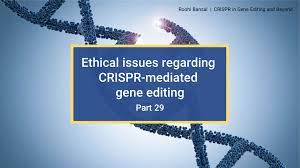Introduction to Genetic Editing
Genetic editing, a revolutionary field in biotechnology, involves altering an organism’s DNA sequence to achieve desired traits or outcomes. With advancements in technology, genetic editing has become more precise and accessible, raising important ethical questions.
Understanding CRISPR-Cas9
One of the most significant breakthroughs in genetic editing is CRISPR-Cas9. CRISPR-Cas9 is a tool derived from a natural defense mechanism found in bacteria, allowing scientists to precisely edit genes within an organism’s DNA.
Applications of CRISPR-Cas9
CRISPR-Cas9 holds immense potential across various fields. In medicine, it offers the possibility of curing genetic diseases by correcting faulty genes. In agriculture, it enables the development of crops with improved traits, such as resistance to pests and diseases.
Ethical Implications of Genetic Editing
Despite its promising applications, genetic editing raises ethical concerns. One major consideration is the balance between the benefits of genetic editing and the potential risks, including unintended consequences and unforeseen genetic mutations.
Regulation and Oversight of Genetic Editing
To address ethical concerns, there is a need for robust regulation and oversight of genetic editing technologies. Current regulations vary globally, with some countries imposing strict guidelines, while others have more lenient approaches.
Public Perception and Acceptance
Public perception of genetic editing is influenced by cultural, religious, and societal norms. Engaging with stakeholders, including ethicists, policymakers, and the general public, is crucial in shaping the responsible use of genetic editing technologies.
Conclusion
In conclusion, while genetic editing, particularly CRISPR-Cas9, holds immense promise for improving human health and agricultural productivity, it also presents ethical challenges that must be carefully navigated. Balancing scientific advancement with ethical considerations is essential in ensuring the responsible and beneficial use of genetic editing technologies.
FAQs
- What are the potential benefits of CRISPR-Cas9?
CRISPR-Cas9 offers the potential to cure genetic diseases, improve agricultural productivity, and advance scientific research.
- Are there any risks associated with genetic editing?
Yes, genetic editing carries risks such as unintended consequences, genetic mutations, and ethical dilemmas.
- How are genetic editing technologies regulated?
Regulation of genetic editing technologies varies by country, with some imposing strict guidelines to ensure responsible use.
- What role does public perception play in the ethical debate surrounding genetic editing?
Public perception influences the ethical debate by shaping attitudes towards the risks and benefits of genetic editing.
- How can stakeholders ensure the responsible use of genetic editing technologies?
Stakeholders can promote responsible use through robust regulation, transparent communication, and ethical decision-making processes.

